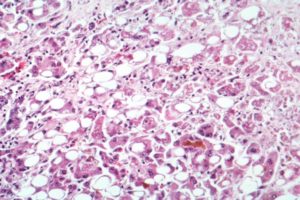 Simply put, alcoholic hepatitis describes liver damage caused by drinking alcohol. It results in liver inflammation and damage to the vital functions of the liver.
Simply put, alcoholic hepatitis describes liver damage caused by drinking alcohol. It results in liver inflammation and damage to the vital functions of the liver.
Alcoholic hepatitis is a treatable form of liver disease, though, up to 40 percent of patients who have the severe form of the disease die within six months once they develop symptoms. This alarming statistic should not only serve as a wake-up call to your or your loved one to keep your drinking of alcohol in check, but to seek treatment if alcohol abuse or alcoholic hepatitis is suspected.
Who Gets Alcoholic Hepatitis?
People who drink alcohol heavily over many years are more likely to develop alcoholic hepatitis. However, it is important to know that alcoholic hepatitis does occur in people who only drink moderately, and not every heavy drinker will develop the disease. Men have a lower risk of developing alcoholic hepatitis than women.
The type of alcoholic beverage you drink and how you drink also impacts the risk of who develops the disease. Hard alcohol spirits and beer increase the risk more so than drinking wine. Binge drinking and drinking excessively for many years also increases the risk. People who are obese and drink heavily are also at an increased risk for developing the disease.
How Does Alcoholic Hepatitis Develop?
When the alcohol you drink breaks down, it produces highly toxic chemicals. These toxic chemicals spark inflammation that damages and eventually destroys liver cells. Over time, healthy liver tissue is replaced with damaged liver tissue in the form of spider-web type scars. This damaged liver tissue interferes with the liver’s ability to function normally. Ultimately, this irreversible scarring results in cirrhosis of the liver, and is the final stage of alcoholic liver disease.
Signs and Symptoms of Alcoholic Hepatitis
There is not one tell-tale sign or symptom that signals alcoholic hepatitis. Rather, there are many signs that point to the disease, including:
- Yellowing of the skin and whites of the eyes (jaundice)
- Increased girth/abdominal swelling
- Decrease or loss of appetite
- Increased thirst and dry mouth
- Weight loss
- Tiredness and fatigue
- Nausea and vomiting
- Itchy skin
- Spider veins
- Redness in the palms of the hands and soles of the feet
- Pale skin or dark skin
- Abdominal tenderness and pain
- Malnourishment
Severe forms of alcoholic hepatitis include these symptoms:
- Confusion
- Fluid retention
- Kidney failure
- Liver failure
Because the symptoms of alcoholic hepatitis are varied and can mimic other health conditions, it is important to contact your doctor for diagnosis and treatment if you develop any of the above symptoms.
Diagnosing Alcoholic Hepatitis
Your doctor will conduct a physical examination and check to see if your liver is enlarged. He or she will order a number of tests to confirm an alcoholic hepatitis diagnosis. These include:
- Blood Work consisting of a complete blood count (CBC) and liver function tests
- Ultrasound of the liver
- Abdominal CT scan
In the event that the above options are not conclusive, your physician may advise you to get a liver biopsy. With a liver biopsy, a small tissue sample is removed from the liver. It is an invasive procedure, but will indicate whether you have alcoholic hepatitis.
Treatment Options for Alcoholic Hepatitis
First and foremost, if you have been diagnosed with alcoholic hepatitis, even in its earliest stages, you must stop drinking immediately. In some cases, by refraining from drinking alcohol, you can reverse the damage that has already occurred to your liver.
Medications that reduce liver inflammation and improve its function may also be necessary. If you are determined to be malnourished, you may need to take nutritional or vitamin supplements, or if severely malnourished, you might need a feeding tube that delivers nutrient rich food to you.
In cases of a severely damaged liver, you may need a liver transplant. There are qualifications for being approved for a liver transplant that include abstaining from alcohol for at least six months, and possibly agreeing to attend counseling.
Preventing Alcoholic Hepatitis
Preventing the development of alcoholic hepatitis in the first place is the best course of action. If you or a loved one is faced with alcohol addiction, make the decision to recover and enter treatment.
Sources
http://www.nejm.org/doi/full/10.1056/NEJMra0805786
